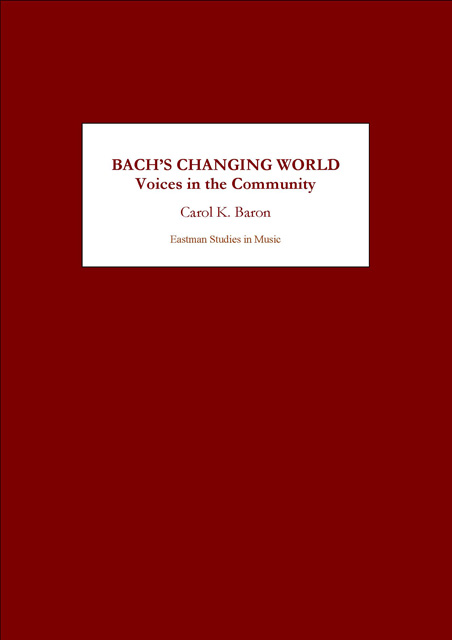Book contents
- Frontmatter
- Dedication
- Map
- Contents
- List of Illustrations
- Editor's Acknowledgments
- 1 Transitions, Transformations, Reversals: Rethinking Bach's World
- 2 Tumultuous Philosophers, Pious Rebels, Revolutionary Teachers, Pedantic Clerics, Vengeful Bureaucrats, Threatened Tyrants, Worldly Mystics: The Religious World Bach Inherited
- 3 Family Values and Dysfunctional Families: Home Life in the Moral Weeklies and Comedies of Bach's Leipzig
- 4 Bach in the Midst of Religious Transition
- 5 Bach's Situation in the Cultural Politics of Contemporary Leipzig
- 6 The Reception of the Cantata during Leipzig Church Services, 1700–1750
- 7 From Salon to Kaffeekranz: Gender Wars and the Coffee Cantata in Bach's Leipzig
- 8 A Treatise on Liturgical Text Settings (1710)
- 9 Random Thoughts About Church Music in Our Day (1721)
- Notes on the Contributors
- Index
- Eastman Studies in Music
1 - Transitions, Transformations, Reversals: Rethinking Bach's World
Published online by Cambridge University Press: 17 March 2023
- Frontmatter
- Dedication
- Map
- Contents
- List of Illustrations
- Editor's Acknowledgments
- 1 Transitions, Transformations, Reversals: Rethinking Bach's World
- 2 Tumultuous Philosophers, Pious Rebels, Revolutionary Teachers, Pedantic Clerics, Vengeful Bureaucrats, Threatened Tyrants, Worldly Mystics: The Religious World Bach Inherited
- 3 Family Values and Dysfunctional Families: Home Life in the Moral Weeklies and Comedies of Bach's Leipzig
- 4 Bach in the Midst of Religious Transition
- 5 Bach's Situation in the Cultural Politics of Contemporary Leipzig
- 6 The Reception of the Cantata during Leipzig Church Services, 1700–1750
- 7 From Salon to Kaffeekranz: Gender Wars and the Coffee Cantata in Bach's Leipzig
- 8 A Treatise on Liturgical Text Settings (1710)
- 9 Random Thoughts About Church Music in Our Day (1721)
- Notes on the Contributors
- Index
- Eastman Studies in Music
Summary
Introduction
Johann Sebastian Bach's life and works are neither what this book is about nor central to these chapters. They are, however, the raison d’être for this study that moves away from the composer and into the community in which he spent the last, longest, and most prestigious part of his professional career. The chapters highlight developments and issues that characterize Leipzig and the Saxon Electorate in an exceptional period in their history: roughly coinciding with Bach's lifetime (1685–1750), the early German Enlightenment, and the central years of the “age of absolutism,” which is usually located between the end of the Thirty Years’ War (1648) and the dissolution of the Holy Roman Empire (1806).
Bach moved to Leipzig when he was thirty-eight years old, an accomplished and famous organist but a less well-known, albeit mature, composer. Bach’s Leipzig experiences could not, therefore, have determined his musical predilections or personal values but, rather, we can assume they contributed to his subsequent growth and to the inclinations and preferences of his later years. The portrait of Bach in Figure 1.1, one of several by a prestigious Leipzig portraitist, was painted four years before the composer died. Presumably Leipzig offered Bach a distinctive set of opportunities that were compatible with his interests and goals. Because Bach applied for this position at a stage in life when other opportunities would have been open to him—and he is known to have sought and rejected other positions—we can assume that his choice was significant and that Leipzig's reputation was a factor in his decision.
Leipzig was a wealthy commercial center whose favorable location at the crossroads of important trade routes determined its success as the site of trade fairs dating back to the twelfth century. Its Saxon princes (or electors) in the capital city of Dresden, prone to a conspicuously luxuriant life-style and extravagant court displays and, furthermore, supporting an army for a series of limited but expensive and, in effect, continuous European wars, depended on the money and goods Leipzig's merchants could supply. The trade fairs attracted merchants from all over Europe and Asia, and goods could be found from as far away as Russia and America.
- Type
- Chapter
- Information
- Bach's Changing WorldVoices in the Community, pp. 1 - 34Publisher: Boydell & BrewerPrint publication year: 2006



